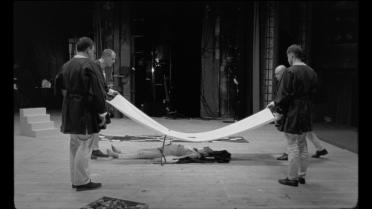
Sink Down Mountain, Rise Up Valley
PRODUCTION from 18 Mar 2015 to 31 Jan 2016
9 years and 4 months ago
Produced by Lafayette Anticipation, Fondation d'entreprise Galeries Lafayette in collaboration with a large number of private and public partners, the play written and directed by Ulla von Brandenburg goes back to the roots of social utopias and a positivism that, though now outmoded, once incarnated the hope of an aesthetic renewal, synonymous with social progress, mobility, industrial technology, accessibility and the abolition of privilege.
Sink Down Mountain, Rise Up Valley is a commission produced as part of Fondation de France's Nouveaux Commanditaires initiative for the Saint-Simoniens residence in Ménilmontant, the project comprise a performance, a film and an installation.
The play written and directed by Ulla von Brandenburg goes back to the roots of social utopias and a positivism that, though now outmoded, once incarnated the hope of an aesthetic renewal, synonymous with social progress, mobility, industrial technology, accessibility and the abolition of privilege.
When Ulla von Brandenburg met the inhabitants of the Saint-Simoniens residence, especiallyJack Liesveld, the artist first thought her commission could take the form of an enormous banner hung on the side of the residence, which is perched on the hill in Menilmontant where Saint-Simon’s disciples prospered in 1832. The Saint-Simonianism she discovered at that time seemed to offer obvious historical and social resources that could shine forth from the Parisian heights, sending down an echo of past utopias.
But after interviews with the “nouveaux comanditaires” or new sponsors the residents of course, the mediators and their institutional partners Ulla von Brandenburg uncovered much more than just the vestiges of a current of thought; it was the foundations of a genuine vision of society, stillborn in the 19th century and ferociously contemporary.
On the still-smoking embers of the Revolution, Saint-Simonianism called for a fraternal society whose most competent members (industrialists, scientists, artists, intellectuals, engineers…) would be tasked with governing France as economically as possible, in order to create a prosperous country dominated by the spirit of enterprise and principles of freedom, peace and the common good. Motivated by the search for a universal principle capable of underpinning a philosophy conceived as a general science, Count Saint-Simon (1760-1825), who was its instigator, chose universal gravitation as the guiding principle, and from this positivism he derived a social and political theory based on principles of perfect equality. Just as the laws of physics apply indifferently to all human beings, under this empire every person should be able to climb the social ladder according to his or her merits, doing so without lapsing into selfishness and individualism.
The fact that the “woman question” lay at the heart of the doctrine of Saint-Simonianism to the point that it took part in the feminist revival in the 1830s was another reason why Ulla von Brandenburg decided to write a more ambitious work capable of tackling the Saint-Simon spirit in the post-industrial era.

Ulla von Brandenburg, performance Sink down mountain, Raise up valley, Performatik Festival Kaaitheater, Brussels, March 18-19, 2015


Ulla von Brandenburg, video installation, Sink down mountain, Raise up valley, Performa 15, New York, November 6-15, 2015

